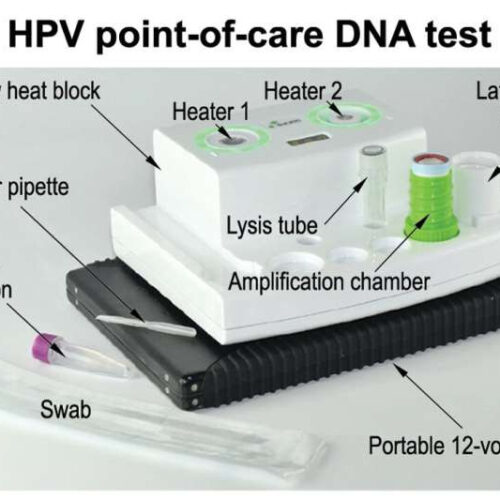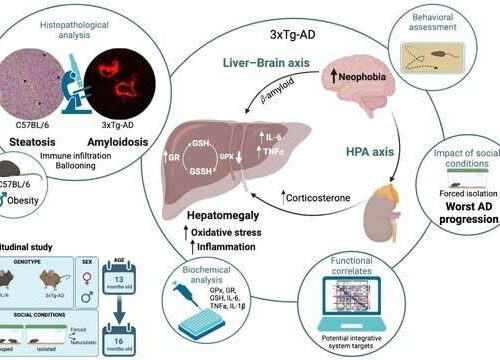by St. Anna Children’s Cancer Research Institute Healthy T cells (left) and DOCK11-deficient T-cells (right) with visible nucleus (blue) and aktin-cytoskeleton (green). Credit: St. Anna Children’s Cancer Research Institute In the quest to find the origin of the puzzling symptoms in four children, researchers from St. Anna Children’s Cancer Research Institute, the CeMM Research Center...
DNA test could broaden access to cervical cancer screening
by Jade Boyd, Rice University A low-cost, point-of-care DNA test for HPV infections that was invented at Rice University delivers results in 45 minutes and requires just two pieces of equipment, a small centrifuge (not shown) that costs about $500 and NATflow, a purpose-built, dual-chamber heater that uses disposable cartridges to prevent false positives arising from...
Novel device holds promise for diagnosing tuberculosis in the ‘missing millions’
by Elsevier Representative sputum samples from: A: smear negative, but culture positive (very low bacillary load); B: smear positive grade +1; C: smear positive grade 2+. A correlation between smear positive grading of the sputum sample and the visual count of captured particles of bacilli (indicated by arrows) is seen. Credit: Adapted from Moore et al., The...
Low oxygen levels restore balance and coordination in a mouse model of a movement disorder
by Allessandra DiCorato, Broad Institute of MIT and Harvard Friedreich’s ataxia is a rare, inherited disease that causes progressive nervous system damage, impairing balance and coordination and leaving patients unable to walk by early adulthood. Now, researchers at the Broad Institute of MIT and Harvard have found that treatment with continuous hypoxia—low-oxygen conditions comparable to levels...
Researchers show the importance of the liver-brain axis in Alzheimer’s disease
by Autonomous University of Barcelona A research team from the Universitat Autònoma de Barcelona (UAB) has studied the livers of Alzheimer’s disease mice models and described morphological, cellular, and functional alterations. In addition, they demonstrated the importance of the liver-brain axis regarding the psychological symptoms of the disease. Traditionally, research in Alzheimer’s disease has focused exclusively...
Acetate controls endothelial-to-mesenchymal transition: Potential therapeutic target for reducing atherosclerosis
by Yale School of Medicine In a new study, researchers including Yale School of Medicine’s Michael Simons, MD, identify the molecular underpinnings of persistent endothelial-to-mesenchymal transition (EndMT), an important process related to vascular inflammation in diseases including pulmonary hypertension. Researchers found atypical acetate production from glucose triggered metabolic modulation of the endothelium activated TGF-β signaling, triggering a...
A probiotic may help treat dry eye disease, according to a study in mice
tA probiotic bacterial strain may help with dry eye, a study in mice suggests. Image credit: Jonathan Knowles/Getty Images. About 12% of the global population has dry eye, a condition in which the eyes are unable to self-lubricate sufficiently. There is currently no cure for dry eye disease. Researchers from Baylor College of Medicine in Houston,...
Leukemia spread fueled by messenger particles, shows study
by King Abdullah University of Science and Technology Mass spectrometry analysis reveals HSPCs-derived exosomes are enriched in proteins involved in adhesion and migration. Proteomics analysis of the cargo was performed to uncover putative functions of the isolated exosomes. The KEGG pathways and the Biological Processes from Gene Ontology analysis that were enriched in the KG1a (pink)...
Drug discovery could aid spinal injury recovery
by University of Edinburgh Scientists investigating potential drugs to improve recovery from spinal cord injury have uncovered a promising route to new treatments. Researchers tested more than 1,000 potential drugs and identified that an existing one—cimetidine—improved spinal repair in zebrafish. The drug also helped improve recovery of movement and reduce the extent of spinal cord damage...
Regular Napping Linked to Greater Brain Volume neuroscience
Eve Bender June 21, 2023 Daily napping may help preserve brain health, new research suggests. Investigators at University College London, United Kingdom, and the University of the Republic of Uruguay, Montevideo, found individuals genetically predisposed to regular napping had larger total brain volume, a surrogate of better cognitive health. Valentina Paz, MSc “Our results suggest that napping may improve...









